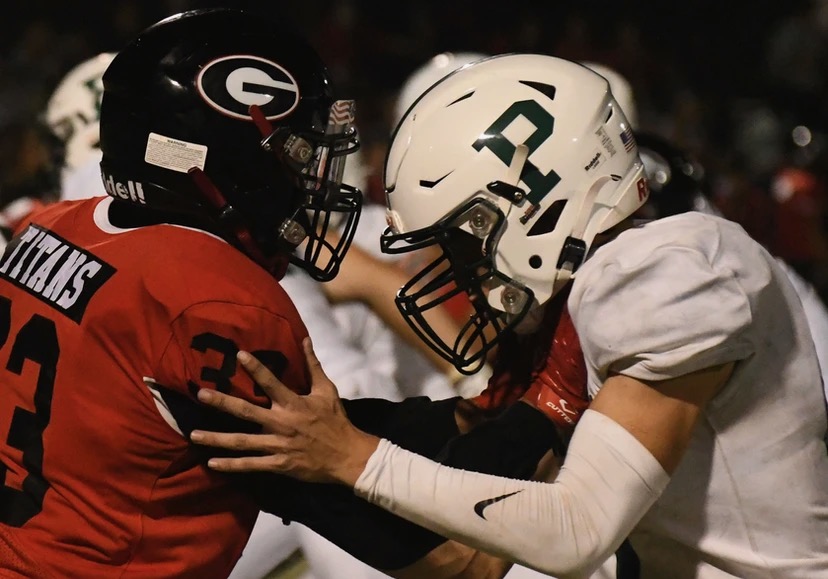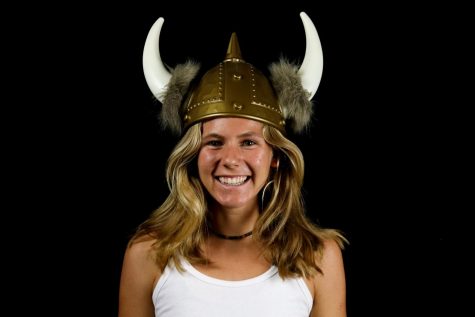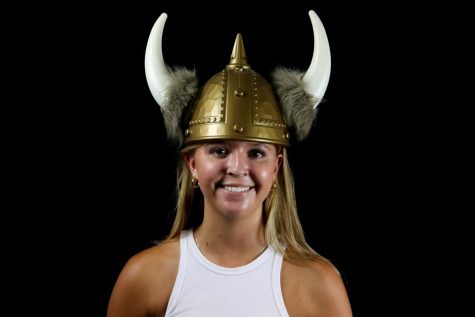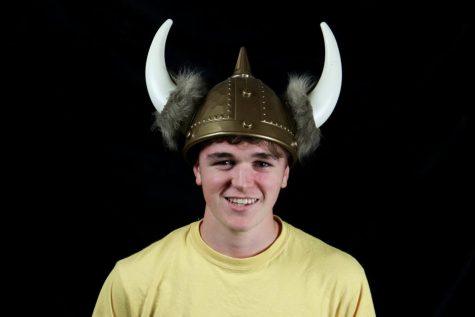Aftermath of the Paly-Gunn Football Game: Exclusive Interview with Principal Brent Kline
On Friday, September 16, Paly Principal Brent Kline released a statement regarding the repercussions of the behavior at the Paly vs Gunn football game the Friday before. That afternoon, Viking Magazine held an exclusive interview with him to hear about the administration’s point of view about the game, questions about said consequences, and musings about the larger culture of Paly and society in general.
Cameron Toland:
What would you say really went down at this game? What happened from the administrator’s point of view?
Kline:
I would say the biggest thing that went down is that we just had students that left the Paly side and made their way — through administrators and the athletic director and other adults — and went up into the Gunn stands. I think that’s the big deal. Not only did they go there, but they refused to comply with instructions to stop. That’s a big deal.
Elizabeth Fetter:
Can you touch on the [Paly vs Gunn] 1990 fight?
Kline:
I know there has been this constant, ongoing badgering between the two schools and I’m not sure why. I don’t know the root cause of it, and why it’s always been that way.
Fetter:
Looking at the 1990 fight versus now, I feel like the culture has really shifted in terms of what we deem as okay. Why [has] the culture changed how it’s changed? How do you think it has changed how we view events like these?
Kline:
Speaking for myself, maybe we all forgot how to be. Sometimes I just hate looking at the news in the morning, because by the time I get to school I’m cranky. I think that we’re allowing some of the outside influences to dictate who we are as people, and then that affects who we are as a group of people here at Paly. I think we’re still learning how to get along and we’re still learning who we are as what our values are as people now because I think it’s different than it was three, four years ago.
Fetter:
Do you think COVID has been a big part of that?
Kline:
It’s just the whole uncertainty of tomorrow. I think that we have a lot of anxiety still going on. I think it’s maybe coming out of us in different ways than it ever has before. Maybe that’s all that was on Friday. Just students expressing themselves. I’m all for that, but you’ve got to do it in the right way.
Toland:
Would you say Paly has a history of events like these? How does the negative Paly culture and reputation affect events like these?
Kline:
I don’t know if I’ve been here long enough to know how it led to it. This experience at the game reignited that feeling that people have for Paly. It’s like “There they go again breaking the rules or storming out and storming down this stands” or whatever it is.
I purposely used the word “electric spirit” today [in the speech] because it is the spirit here. Paly is a spirit that I’ve never seen before. In a positive way. And sometimes the positive spirit shifts sometimes into negative name calling or negative chanting. We need to be nice people. And I don’t see that all the time. I see that here. I see it right now. I see it when I walk through the school.
Toland:
And how do you think you would prevent an incident like this from happening again?
Kline:
I doubt if we play [Gunn] again next year. I think we’ll need to take a break. But I think that what we need to do is spend some time learning about what it means to be a good sports person, and a fan of sports, and a fan of life, and do that better.
Toland:
Can you elaborate on what [the administration is] planning to do to educate students about sportsmanship before homecoming?
Kline:
We’re looking at advisory, study hall, and short online class modules that all students will have to do. And the discussion will be backed up with that, but something really quick at first, just so we get on the same page.
Jackson Martin:
In your announcement [Friday morning] you talked about the fine from the SCVAL. What is it for?
Kline:
I’m still trying to figure that out. Next week, I have a Board of Managers meeting further with the [SCVAL] because that’s where all these sanctions were handed down from. I’ve done a counter proposal that I’m not going to go into right now — I can’t. Basically, the fine would be revenue for the upcoming game that you can’t go to [against Menlo].
Martin:
For the Homecoming game we might be supervised [by league officials]. Do you want to elaborate on that?
Kline:
That’s something that might or might not happen. I’ll know next week, but we could be observed by a member of the SCVAL board, or a representative from SCVAL to observe you to ensure that we have learned our lesson and can manage ourselves at a high school football game.
Toland:
Collective punishment was one thing we were discussing with some teachers in our classes; a group of people’s actions affecting everyone as a school. I’m curious to your perspective on that. Was there any thought to try to look at a smaller group of people’s behavior?
Kline:
Well, I hope you understand that the sanctions weren’t started by me. I feel that our entire school is being punished by a group of people that decided to do something out of the ordinary. We’ve spent time discovering and understanding who exactly it was. But when you have a mob — which it was — it’s difficult. It’s always our responsibility to understand how things happen and where they started from, [but] sometimes it’s next to impossible.
Fetter:
Last question here. [Right now] Paly has a system where there are a few consequences for small things and then really big consequences [for really bad things] and nothing in the middle. What are your thoughts on that?
Kline:
There is something lacking in the middle. Absolutely. Or from the very beginning. I’m not going to add more discipline stuff. I think that I’d rather come at it from: how can we help inform you better to be a person that shows up on time? I spent so much of my principalship [20 years ago] when I first started, suspending kids for 10 days. which was like 20 years ago, that was a long time ago. That’s what I used to suspend kids for, you know, 10 days.
We’re all part of this school. I’m hoping my message could be going forward is: who are you? Who am I? What do you believe in? How can you share what you believe into other people? How can you create what you believe into something cool with a group of people? How can you continue to build that into a community that listens to each other that helps each other?
I think really that’s where we need to stop and pause and focus our energy: Taking who we are as individuals and how can we connect to another person with something similar and purposeful. I think that’s what we’re lacking.






